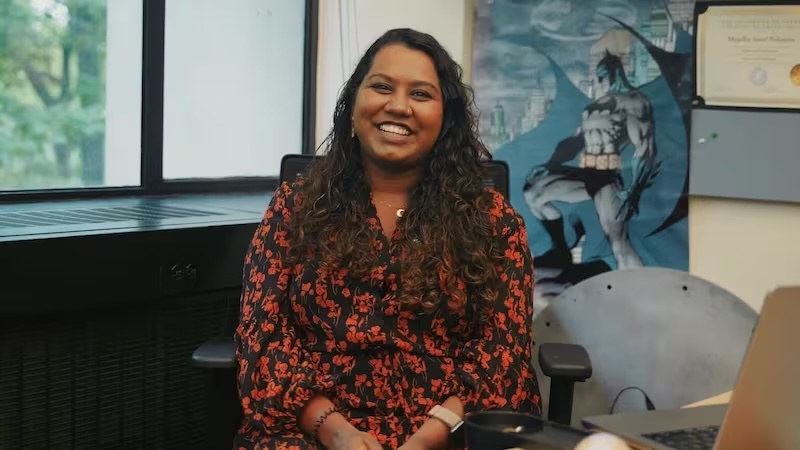1.10.2025
Mugdha Polimera part of team behind SciX, a new open-access portal connecting research in space sciences

Mugdha Polimera says the UAE has 'built a world-class space programme'. Photo: Dr Polimera
An astrophysicist who as a child gazed at stars with Abu Dhabi’s amateur astronomy clubs has helped build a Nasa-funded online platform that could transform how scientists share research.
Mugdha Polimera, 31, who was raised in the UAE, is part of the team behind Science Explorer, or SciX, a new portal with more than 30 million data entries that connects research across astrophysics, planetary science, heliophysics and Earth sciences.
“It’s much more than a search tool. When you open a paper, you don’t just see what it cites, you can also follow every paper that later cites it,” said Ms Polimera, as an astrophysicist and software developer for Nasa’s Astrophysics Data System (ADS).
“We also link research to specific astronomical objects, tag the data sets used and even the software referenced," she told The National. "It takes that value and extends it across Earth and space sciences."
The platform builds on ADS, which was launched in 1992 and has become a trusted source in the scientific community for astronomy-related research. But now SciX will bring together researchers from many more disciplines that share and use data.
“Earth sciences are Nasa’s largest research field, covering everything from climate and weather to agriculture, rivers, glaciers and volcanoes,” said Ms Polimera.
“Having a curated, authoritative platform that connects these disciplines will help researchers share methods, tools and data in a way that hasn’t been possible before.”
Ms Polimera said the most exciting part of SciX, which is free to use worldwide, is the increased reliability of the research results.
“Predatory journals are excluded,” she said. "That means researchers don’t waste time questioning whether a source is credible … they can focus on the science."
From Abu Dhabi to astrophysics
Born in India, Ms Polimera moved to Abu Dhabi as a baby and grew up in the capital, where her curiosity about space was sparked by Hindu mythology and stargazing.
“I was fascinated not just by stars and planets, but also by the way they were woven into Indian folklore,” she said. “For example, the Big Dipper is called 'Saptarishi' (seven sages) and the Pleiades are 'Kritikas', their wives. I loved that the same constellations had different stories across cultures.”
She attended St Joseph’s School in Abu Dhabi until Year 10, then Sunrise English Private School, before studying electronics and communications engineering at BITS Pilani, Dubai.
At the time, the UAE did not have an established space programme and astronomy courses were limited, so Ms Polimera chose engineering and hoped it would act as a stepping stone to astrophysics.
“Even then I tried to bring astronomy into my coursework,” she said. “In image and signal-processing classes, I pitched space-related projects to my professors.”
She also sought out the few astronomy clubs that existed in Abu Dhabi, attending talks on Mars missions and meeting fellow enthusiasts. “Those experiences were small but important and they kept me connected to the field,” she said.
What does the future hold?
After her degree, Ms Polimera moved to the US to pursue a master’s then a doctorate in astrophysics.
She now splits her time between black hole research and her role as a software engineer with the ADS and SciX team. She says the transformation in the UAE’s space sector over the past decade has been significant.
“The difference is night and day," said Ms Polimera. "In 10 years, the country has built a world-class programme. That’s very characteristic of the UAE … they set a goal and made it happen quickly."
She said young people in the UAE today have opportunities that did not exist for her generation. “There are expanded course offerings, active clubs and huge investment in research and education,” she said.
“The space programme acts as a hook, getting students excited about science and technology. I’d love to come back and give seminars or tutorials to help students learn how to navigate these systems.”
Quelle: The National
